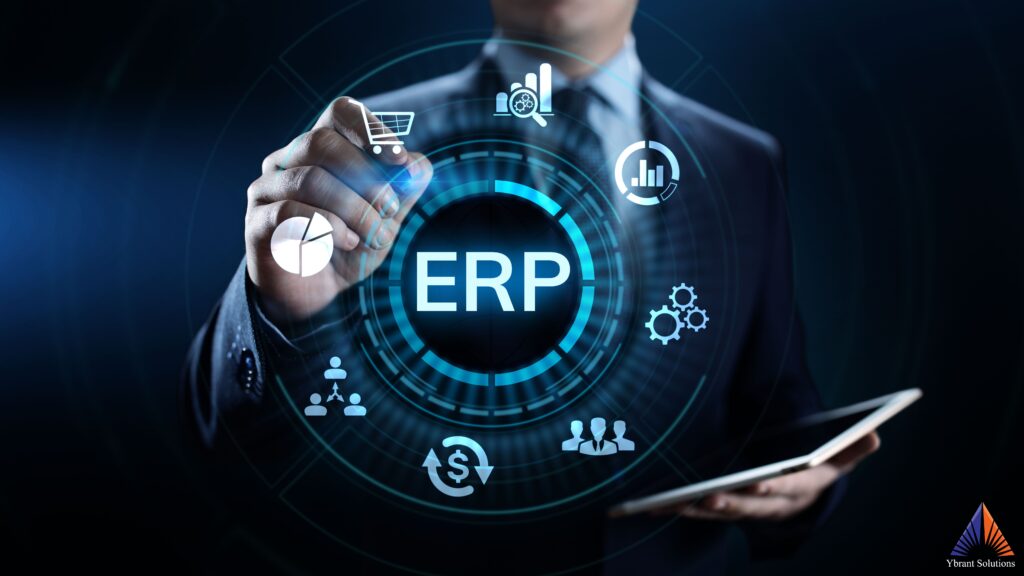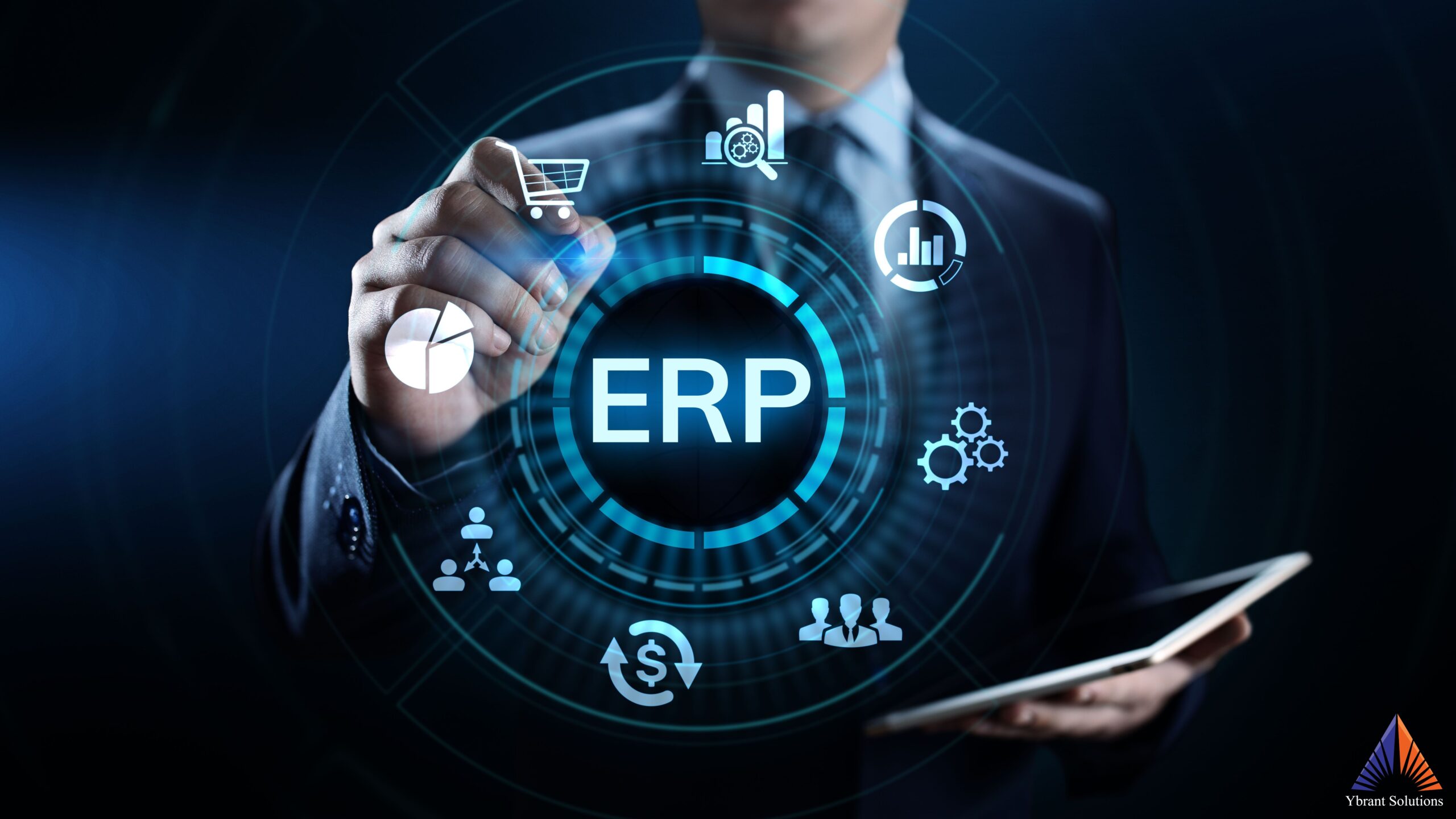This blog is about steps to be taken for ERP Pre-Implementation phase.
3 part series: Why ERP? | 100-Day ERP Discovery | ERP Technology Selection
What is ERP?
Enterprise Resource Planning (ERP) is a type of software that organisations use to manage day-to-day business activities such as HR, Finance, Procurement, Project Management, Risk & Compliance, and Supply Chain operations. ERP systems tie together a multitude of business processes and enable the flow of data between them. By collecting an organisation’s shared transactional data from multiple sources, ERP systems eliminate data duplication and provide data integrity with a single source of truth.
ERP Journey
Great news, if you have already decided to go for ERP. Bringing ERP into your organisation is journey is a major decision, which can run into multiple years. We can divide this journey into 3 phases.
- Pre-Implementation: Tasks completed to organise your team and selecting the right ERP technology for your organisation. This includes, aligning your business and technology objectives, getting the business case approved. Selecting the right ERP vendor, Systems Integration (SI) partner.
- Implementation: Tasks completed to kick off the implementation programme, detailed design, build, test, deploy, change management, user training and transition to support.
- Post-Implementation: Tasks completed to receive transition, setting up support teams, receive training from project team. Continue on change management activities for users adoption. Mature the solution, derive benefits.
Refer to our ERP Solutions page to see what Ybrant can do for you.
Initiate 100-day ERP Discovery Plan
Embarking on an ERP implementation journey is a significant undertaking that requires careful planning, strategic alignment, and a clear understanding of organizational objectives. At Ybrant Solutions, we recognize the importance of a structured approach to ERP discovery to ensure a seamless transition and maximize the benefits of the new system. Here, we outline a comprehensive 100-day plan for ERP discovery, highlighting key assumptions, existing challenges, governance and compliance risks, considerations based on organizational objectives, principles, and pillars essential to achieving the target operating model.

Assumptions
Before diving into the ERP discovery process, it’s crucial to establish certain assumptions that will guide the journey:
- Stakeholder Engagement: Key stakeholders across all departments will actively participate and provide necessary insights.
- Resource Availability: Adequate resources, including time, personnel, and budget, are allocated to the discovery phase.
- Change Readiness: The organization is prepared for change and has mechanisms in place to manage it effectively.
- Current State Documentation: Existing processes, systems, and workflows are documented and available for analysis.

Existing Challenges
Understanding the existing challenges is essential for tailoring the ERP solution to address pain points effectively:
- Data Silos: Fragmented data across various systems leading to inefficiencies and inaccuracies.
- Process Inefficiencies: Outdated or redundant processes that hinder productivity.
- Lack of Integration: Disconnected systems that impede seamless information flow.
- Scalability Issues: Current systems unable to support growth and evolving business needs.
Governance and Compliance Risks
Governance and compliance are critical components of any ERP implementation:
- Regulatory Requirements: Adherence to industry-specific regulations and standards.
- Data Security: Ensuring robust data protection measures are in place to prevent breaches.
- Audit Trails: Maintaining comprehensive records to support audits and compliance checks.
- User Access Control: Implementing strict access controls to safeguard sensitive information.
Considerations Based on Organizational Objectives
Aligning the ERP discovery process with organizational objectives ensures that the new system supports overall business goals:
- Efficiency and Productivity: Streamlining operations to enhance productivity and reduce costs.
- Customer Satisfaction: Improving customer interactions and service delivery.
- Growth and Scalability: Ensuring the ERP system can support future expansion and evolving business needs.
- Innovation: Enabling the organization to leverage new opportunities and stay competitive.
Principles and Pillars for Success
Establishing guiding principles and foundational pillars is crucial for a successful ERP discovery process:
- Alignment: Ensuring the ERP solution aligns with business strategies and objectives.
- Flexibility: Building a system that can adapt to changing business environments.
- User-Centricity: Focusing on the needs and experiences of end-users.
- Sustainability: Implementing processes and systems that are sustainable in the long run.

Key Steps in the 100-Day Plan
Days 1-10: Kickoff and Stakeholder Engagement
- Conduct a project kickoff meeting to align expectations and objectives.
- Identify and engage key stakeholders across all departments.
- Establish a project governance structure, including roles and responsibilities.
Key Senior Stakeholders
| Role in the organisation | Role Description | Input to ERP Programme |
| CEO | Sets overall strategy and direction for the organisation. Responsible to manage the expectations of the board and stakeholders. | Defines strategic objectives and ensures alignment with business goals.Provides executive sponsorship and secures necessary resources.Champions the program and drives organizational commitment. |
| CFO | Manages the financial planning, risk management, and financial reporting.Oversees budgeting, auditing, and financial controls. | Ensures the ERP system supports financial reporting and compliance requirements.Provides insights on budget allocation and cost management. Evaluates financial risks and benefits associated with the ERP implementation. |
| CIO | Oversees the IT strategy, infrastructure, and technology investments.Ensures IT operations align with business goals and objectives. | Leads the selection and implementation of the ERP system.Ensures integration with existing IT infrastructure and systems.Manages technical resources and addresses IT-related challenges. |
| Head of Operations | Oversees daily operations and ensures efficiency in business processes.Manages supply chain, logistics, and production activities. | Identifies operational requirements and process improvements.Ensures the ERP system supports operational workflows and efficiencies.Provides insights on optimizing supply chain and logistics management. |
| Head of HR | Manages employee relations, recruitment, training, and development.Oversees HR policies, compliance, and organizational culture. | Ensures the ERP system supports HR functions and processes.Provides insights on change management and employee training needs.Assesses the impact on organizational culture and employee engagement. |
| Key Department Heads | Lead their respective departments (e.g. Sales, Supply Chain, Manufacturing etc.), ensuring alignment with overall business objectives. Manage department-specific processes, resources, and performance. | Provide detailed insights into department-specific processes and requirements.Ensure department needs are considered in the ERP system configuration.Facilitate user acceptance testing and feedback within their departments.Support change management efforts by communicating benefits and changes to their teams. |
Resources Required
| Role in the Organisation | Role Description | Inputs |
| Project Manager (Full-time) | Oversees the entire ERP project, ensuring it is completed on time, within scope, and on budget.Manages project resources, schedules, and risks. | Develops and maintains the project plan.Coordinates with stakeholders and team members to ensure alignment and progress.Monitors and reports on project status, addressing any issues or deviations. |
| ERP Consultants (Part-time) | Provide specialized expertise and advice on ERP system selection, configuration, and implementation.Offer industry best practices and insights based on prior ERP implementations. | Conduct requirement analysis and system design.Assist in system configuration and customization.Provide training and support to internal teams. |
| Business Analysts (Full-time) | Analyze business processes and requirements, ensuring they are accurately captured and addressed in the ERP system.Serve as a bridge between business units and the IT/ERP implementation team. | Gather and document detailed business and technical requirements.Facilitate workshops and interviews with stakeholders to understand needs and pain points.Validate requirements and ensure they are incorporated into the ERP system design. |
Outputs: Project kickoff meeting, Stakeholder engagement, Governance structure, Board objectives, Initial audit observations
Days 11-30: Current State Analysis
- Gather and document existing processes, systems, and workflows.
- Conduct workshops and interviews with stakeholders to identify pain points and requirements.
- Analyse current data flows and integration points.
| Resource Type | Resource | Availability | Inputs |
| Key Senior Stakeholders | Department HeadsIT Managers | Part time | Provide existing business processes, IT landscape, Regulatory requirements. Audit observations. |
| Discovery Team | Project Manager Business Analysts ERP Consultants Data Analysts | Full Time Full Time Part Time Full Time | Review and map the business processes, identify the gaps. |
- Outputs: Documentation of existing processes, Workshops and interviews, Data flow analysis, Compliance checklists, Detailed audit observations.
Days 31-50: Future State Vision
- Define the future state vision based on organizational objectives and stakeholder input.
- Identify gaps between the current state and the desired future state.
- Develop high-level process maps and workflows for the future state.
| Resource Type | Resource | Availability | Inputs |
| Key Senior Stakeholders | Executive Team, Department Heads | Part time | Provide inputs future state vision. Articulate the end state organisation. |
| Discovery Team | Project Manager Business AnalystsERP Consultants | Full TimeFull TimeFull Time | Receive the inputs for the future state vision and map to the processes and requirements. |
Outputs:
- Future state vision, Gap analysis, High-level process maps, Regulatory requirements mapping
Days 51-70: Requirement Gathering and Prioritization
- Compile detailed business and technical requirements.
- Prioritize requirements based on business impact and feasibility.
- Validate requirements with stakeholders to ensure alignment.
| Resource Type | Resource | Availability | Inputs |
| Key Senior Stakeholders | Department HeadsIT Managers | Part time | Provide inputs to the business and technical requirements. |
| Discovery Team | Project Manager Business AnalystsERP Consultants | Full TimeFull TimeFull Time | Review the high-level requirements and present in the workshops. |
| Stakeholder Input Sessions | Stakeholders across the business | Part Time | Provide inputs to the high-level requirements and identify the gaps. |
Outputs:
- Detailed business and technical requirements, Prioritized requirements, Validated requirements, Governance and compliance framework.
Days 71-90: Solution Options and Feasibility Analysis
- Explore potential ERP solutions and evaluate their fit with the organization’s needs.
- Conduct feasibility analysis, considering factors such as cost, scalability, and integration capabilities.
- Present findings and recommendations to stakeholders.
| Resource Type | Resource | Availability | Inputs |
| Key Senior Stakeholders | CIOIT Managers | Part time | Provide inputs on the ERP solutions considered suitable for the organisation. |
| Discovery Team | Project Manager ERP ConsultantsFinancial Analysts | Full TimeFull TimePart Time | Review the inputs and add specific features suitable for the organisation. |
Outputs:
- ERP solution options, Feasibility analysis, Recommendations, Risk and compliance assessment.
Days 91-100: Roadmap and Planning
- Develop a comprehensive roadmap for ERP implementation, including timelines and milestones.
- Define the target operating model and outline the steps to achieve it.
- Establish a change management plan to ensure smooth adoption and transition.
| Resource Type | Resource | Availability | Inputs |
| Key Senior Stakeholders | Executive TeamProject Steering Committee | Part time | Review the roadmap and provide inputs and direction. |
| Discovery Team | Project Manager ERP ConsultantsFinancial Analysts | Full TimeFull TimePart Time | Receive inputs for roadmap plan, and to prepare the documents. |
Outputs:
- Comprehensive roadmap, Target operating model, Change management plan, Final audit compliance report
For additional information refer to this link from Gartner on ERP
Aligning the Ducks in a Row
To ensure the success of the ERP discovery process, it is crucial to have all components aligned and working harmoniously:
- Clear Communication: Maintain open and transparent communication with all stakeholders throughout the process.
- Strong Leadership: Ensure strong leadership and support from senior management to drive the project forward.
- Continuous Monitoring: Regularly monitor progress against the plan and adjust as necessary to stay on track.
- Stakeholder Buy-In: Secure buy-in from all stakeholders by involving them in decision-making and keeping them informed.
At Ybrant Solutions, we are committed to guiding our clients through a structured and strategic ERP discovery process. By following this 100-day plan, organizations can lay a solid foundation for successful ERP implementation, driving efficiency, and achieving their business objectives. Contact us today to learn more about how we can support your ERP journey.
Here is the detailed 100-day plan for ERP Discovery presented in a Gantt chart format along with the outputs:
Conclusion
By following this structured 100-day plan, organizations can set a solid foundation for ERP implementation. The detailed steps and outputs ensure that all critical aspects are covered, leading to a successful ERP deployment that aligns with business objectives and drives operational efficiency. At Ybrant Solutions, we are committed to guiding our clients through each phase of this journey, ensuring a seamless and effective transition to the new ERP system.




